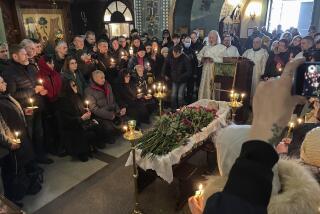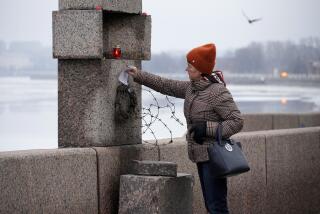EUROPE : Russia’s Royal Bones of Contention
- Share via
MOSCOW — Nearly 78 years after Bolsheviks executed Czar Nicholas II and his family, the relics of Russia’s last royal family retain the power to haunt.
A government commission appointed to identify and inter the remains of the Romanovs has become fearful of declaring the bones--unearthed in 1991 near the execution site in the Ural Mountains city of Yekaterinburg--those of the slain imperial family.
The Russian Orthodox Church, throughout its 1,000-year history an ally of those in power, has shied away from association with any ceremonial reburial or even discussion of whether the Romanovs should be considered holy martyrs.
President Boris N. Yeltsin and other leaders of the post-Soviet Kremlin once made impassioned speeches about Russia’s moral imperative to properly bury its last czar. But in the current climate of uncertainty and flagging reform, there are few voices still arguing for interment.
And the resurgent Communists, who carry the burden of shame for the slayings by their more radical forebears, are unabashedly derisive about plans to accord the exhumed royals a more dignified end.
Despite an official proclamation last summer that the last czar and his family would be laid to rest in St. Petersburg on Atonement Sunday, Feb. 25, preparations for a symbolic burial of the Bolshevik crime have been abandoned.
“What is happening now is the second execution of the czar,” said Edvard S. Radzinsky, Russia’s most prominent historian of the imperial era.
When Yeltsin established the Government Commission for Identification and Reburial of the Last Imperial Family three years ago, Russians were gripped by a passion to correct the misdeeds of the Communists who destroyed a 300-year-old dynasty in a spasm of gunfire and stabbing.
Today, politicians and researchers point out, the Communists control the Russian legislature and could soon return to the Kremlin.
A high-profile repentance over the Bolshevik murders, they say, is no longer politically astute.
For the indefinite future, the bones of Czar Nicholas II, Czarina Alexandra, their five children and four servants and companions will remain in a government storeroom in Yekaterinburg.
“We have absolutely no doubts that the remains are those of the czar and his family,” insisted Vladimir N. Solovyev, special representative of the prosecutor general’s office assigned to investigate the royal slayings. He has painstakingly gathered eyewitness testimonies from surviving members of the assassination squad that killed the exiled Romanovs in a Yekaterinburg basement on July 17, 1918.
Despite the evidence, the Russian Orthodox Church has refused to sanction the reburial or take up the issue of whether the murdered royals should be deemed holy martyrs, Solovyev said.
The Russian Orthodox Church in exile canonized Nicholas II shortly after his death and accused Russia’s religious leaders of kowtowing to the Communists. That has confronted members of today’s Orthodox clergy with the uncomfortable choice of conceding their predecessors were cowed into silence or denying sainthood to the czar and intensifying conflict with Orthodox believers abroad.
Church leaders declined to discuss their present position, saying only that they retain doubts about the identification of the remains.
Meanwhile, the government commission has halted funeral preparations.
The Yeltsin-established commission had verbally deemed the identification complete and called for a state funeral next month. But since Communists began making a comeback in local and parliamentary elections late last year, the panel has all but ceased to function.
Without a formal report deeming the remains identified, the church will not consider canonization. And as long as the church expresses skepticism, the commission will not issue its declaration, said Andrei V. Sebentsov, secretary of the panel.
“It’s like Kafka!” fumed the exasperated Radzinsky, alluding to the Czech literary master of the absurd. “It’s the Russian way to always say, ‘Wait, don’t hurry!’ We have this terrible history of preferring to do nothing.”
More to Read
Sign up for Essential California
The most important California stories and recommendations in your inbox every morning.
You may occasionally receive promotional content from the Los Angeles Times.














